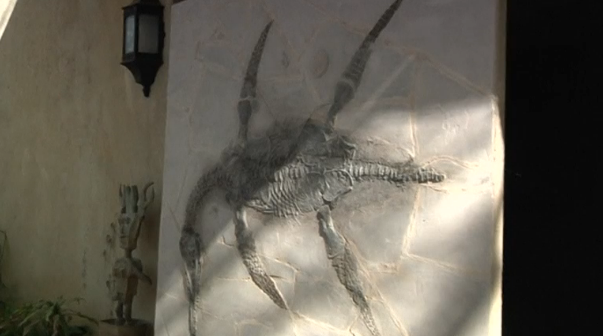
MONTERREY, Mexico (Reuters) — Mexico’s arid desert area has revealed the well-preserved complete skeleton of a new marine reptile that is reportedly 93 million years old, revealing such details of tissue mass and scales previously unseen in other fossils.
The reptile christened the Mauriciosaurus fernandezi was discovered in 2011 by former mayor Mauricio Fernandez in Vallecillo in northeastern Mexico, an area that was once a large ancient seaway.
The fossilized remains of the ancient reptile reveal its soft skeletal tissue structure, from its neck, flippers, torso and tail. It is estimated to have been six-feet (180-cm) long and with a flipper span of nearly four feet (120 cm).
“The Mauriciosaurus is the first dinosaur in the world to show these details. Also it is a new genre and a new species. This helps us to complete the image that we have of these animals that went extinct towards the end of the era of the dinosaurs,” said Dr Wolfgang Stinnesbeck from the University of Heidelberg.
According to experts, such are the details on the fossil that soft tissue shown on the reptile indicates that it had a thin layer of skin with fatty tissue underneath.
“The Mauriciosaurus is the first dinosaur in the world to show these details. Also it is a new genre and a new species. This helps us to complete the image that we have of these animals that went extinct towards the end of the era of the dinosaurs,” added Stinnesbeck.
Mexico is a prime stamping ground for palaeontologists in search of dinosaurs. Due to the region’s diverse climatic factors such as erosion the discovery of fossils and other dinosaur remains is commonplace in northern arid areas of the country.
Mauricio Fernandez, former mayor and dinosaur aficionado, discovered the Mauriciosaurus fernandezi and laments the state of laws protecting fossils in Mexico’s desert areas.
“An enormous extinction on a global scale, a genre that is in my name, I see this as a commitment in a country which has one of the largest areas of paleontologists in the world, with some of the worst laws, with the greatest lack of protections for fossils,” he told Mexico.
The asteroid that reportedly killed off the dinosaurs some 66 million years ago reportedly impacted the planet just off Mexico’s Yucatan Peninsula.







